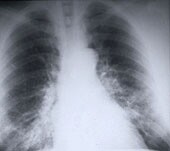 |
 |
 |

Experimental Drug Shows Early Promise Against Cystic Fibrosis
The molecule causes flawed gene to work properly, researchers say|
|
HealthDay
Thursday, August 21, 2008
 WEDNESDAY, Aug. 20 (HealthDay News) -- An experimental drug that blocks the genetic flaw responsible for one form of cystic fibrosis has worked well in an early trial, Israeli researchers report.
WEDNESDAY, Aug. 20 (HealthDay News) -- An experimental drug that blocks the genetic flaw responsible for one form of cystic fibrosis has worked well in an early trial, Israeli researchers report.
"The results have been promising," said Dr. Eitan Kerem, head of pediatrics at Hadassah Hebrew University Hospital in Jerusalem, and lead author of a report published online Thursday in the journal The Lancet.
Cystic fibrosis is an inherited chronic disease caused by a flaw in genes for the channels that allow salt to enter cells, causing the body to produce unusually thick, sticky mucus. It affects the lungs and digestive system of about 30,000 children and adults in the United States and 70,000 people worldwide. Intensive treatment can prolong the lives of patients into their 30s, 40s and beyond, according to the Cystic Fibrosis Foundation.
The people treated in the Israeli trial have cystic fibrosis because of a mutation in the salt channel gene that produces a false "stop" signal, so that the proteins forming the channel aren't produced. The new drug was developed by a New Jersey biotechnology company, PTC Therapeutics, through a screening program that singled out molecules that block such genetic "stop" signals.
The form of cystic fibrosis in the Israeli trial is responsible for about half of all cystic fibrosis cases in that country and for about 10 percent of cases in the United States, where other genetic flaws in channel production predominate.
In the study, 23 Israelis with cystic fibrosis received the drug, designated PCT124, in two cycles -- three doses a day for 14 days, then three higher daily doses after a 14-day pause.
Salt flow reached the normal range in 13 of the 23 cases during the first treatment cycle and in nine of 21 cases in the second cycle. Kerem said the results were "encouraging," but added, "This was a short-term study without placebo, so it shows that a longer-term trial should be done."
A longer trial probably will be started "early next year," Kerem said.
"We are planning a larger long-term study that will be international, in the United States and Canada and also in Europe," said Dr. Langdon Miller, chief medical officer of PTC Therapeutics, which sponsored the study.
PTC124 was developed through a screening program in which hundreds of thousands of compounds, with a light-emitting molecule called luciferase, were aimed at the genetically altered "stop" signal, Miller said. Several compounds hit the target and lit up.
"We selected the best ones, did chemistry to modify them and came up with PTC124," he said.
Several initial studies, including the one in Israel, have shown that PCT124 can help produce salt-conducting channels that are "full length and fully functioning," Miller said.
The drug may be useful for a number of other genetic disorders caused by the same sort of mutation, he added. It already is being tried for another genetic condition, Duchenne muscular dystrophy.
HealthDay
Copyright (c) 2008 ScoutNews, LLC. All rights reserved.
Related News:
More News on this Date
Related MedlinePlus Pages:
| Home | Health Topics | Drugs & Supplements | Encyclopedia | Dictionary | News | Directories | Other Resources | |
| Disclaimers | Copyright | Privacy | Accessibility | Quality Guidelines U.S. National Library of Medicine, 8600 Rockville Pike, Bethesda, MD 20894 National Institutes of Health | Department of Health & Human Services |
Date last updated: 22 August 2008 |




